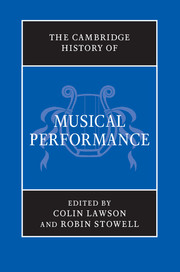Book contents
- Frontmatter
- PART I PERFORMANCE THROUGH HISTORY
- 1 Performance today
- 2 Political process, social structure and musical performance in Europe since 1450
- 3 The evidence
- 4 The performer and the composer
- 5 The teaching of performance
- 6 Music and musical performance: histories in disjunction?
- PART II PRE-RENAISSANCE PERFORMANCE
- PART III PERFORMANCE IN THE RENAISSANCE (C. 1430–1600)
- PART IV PERFORMANCE IN THE SEVENTEENTH CENTURY
- PART V PERFORMANCE IN THE ‘LONG EIGHTEENTH CENTURY’
- PART VI PERFORMANCE IN THE NINETEENTH CENTURY
- PART VII THE TWENTIETH CENTURY AND BEYOND
- PART VIII
- Index
5 - The teaching of performance
from PART I - PERFORMANCE THROUGH HISTORY
Published online by Cambridge University Press: 28 March 2012
- Frontmatter
- PART I PERFORMANCE THROUGH HISTORY
- 1 Performance today
- 2 Political process, social structure and musical performance in Europe since 1450
- 3 The evidence
- 4 The performer and the composer
- 5 The teaching of performance
- 6 Music and musical performance: histories in disjunction?
- PART II PRE-RENAISSANCE PERFORMANCE
- PART III PERFORMANCE IN THE RENAISSANCE (C. 1430–1600)
- PART IV PERFORMANCE IN THE SEVENTEENTH CENTURY
- PART V PERFORMANCE IN THE ‘LONG EIGHTEENTH CENTURY’
- PART VI PERFORMANCE IN THE NINETEENTH CENTURY
- PART VII THE TWENTIETH CENTURY AND BEYOND
- PART VIII
- Index
Summary
Throughout history the ability to perform has been transmitted in different ways that naturally reflect music's position within particular societies. Yet while the underlying educational issues have remained remarkably constant, as is illustrated throughout this book, musical training within each part of the world continues to inspire a wide variety of educational practice in a range of contexts. A comparison of the UK, America and Russia amply demonstrates the point, while the developing love affair between China and Western music bears witness to an ever-changing global landscape. Performance training occurs at various levels; witness the continuing popularity of the independent examination boards across the world, which cater to a vast amateur market while also identifying potential in the very young. In addition, as has recently been observed, musicians have a continuing didactic influence on others outside a conventional teaching environment. Contemporary examples might include competition adjudicators, orchestral players, studio engineers, writers of programme notes, critics or composers. One relatively recent phenomenon that forms part of the training of most young professionals is the music competition, ranging from local amateur events, including children, chamber groups and choirs to international, highly pressured events. The value of competitions is hotly debated, with some deploring the attempt to judge objectively between practitioners of an art that is, at least in some aspects, subjective. As one correspondent in 1885 put it, ‘it is degrading to any art to turn it into a means for commercial advancement’. A further issue is that instrumental competitions tend to encourage conservatism in repertoire choice. Educationally, their value is suspect; arguably the main use of such events is to give exposure to the competitors to further their professional chances.
- Type
- Chapter
- Information
- The Cambridge History of Musical Performance , pp. 135 - 168Publisher: Cambridge University PressPrint publication year: 2012
- 1
- Cited by

